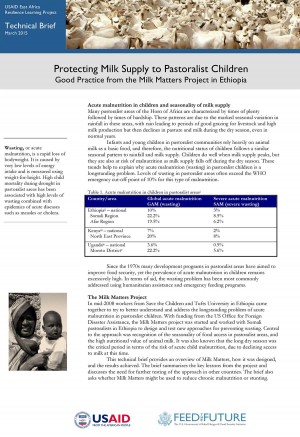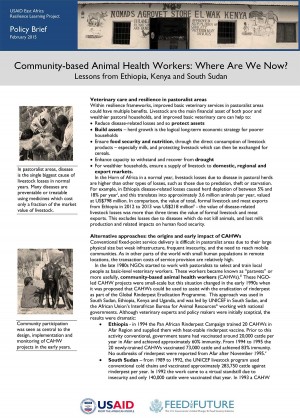Protecting Milk Supply to Pastoralist Children: Good Practice from the Milk Matters Project in Ethiopia
Ethiopia

Protecting Milk Supply to Pastoralist Children: Good Practice from the Milk Matters Project in Ethiopia
This technical brief provides an overview of Milk Matters, how it was designed, and the results achieved. The brief summarizes the key lessons from the project and discusses the need for further testing of the approach in other countries. The brief also asks whether Milk Matters might be used to reduce chronic malnutrition or stunting. In mid-2008 workers from Save the Children and Tufts University in Ethiopia came together to try to better understand and address the longstanding problem of acute malnutrition in pastoralist children.With funding from the US Office for Foreign Disaster Assistance, the Milk Matters project was started and worked with Somali pastoralists in Ethiopia to design and test new approaches for preventing wasting. Central to the approach was recognition of the seasonality of food access in pastoralist areas, and the high nutritional value of animal milk. It was also known that the long dry season was the critical period in terms of the risk of acute child malnutrition, due to declining access to milk at this time.

Community-based Animal Health Workers: Where Are We Now? Lessons from Ethiopia, Kenya, and South Sudan
A policy brief on evidence on community-based animal health workers in Ethiopia, Kenya, and South Sudan. At community-level, CAHWs are seen as valuable service providers and outperform other types of animal health care in most aspects of service provision. The main constraint is the supply of veterinary medicines in contexts of mixed policy support to veterinary privatization and limited government capacity to ensure the quality of imported or locally-manufactured medicines. In Kenya, these issues are compounded by a lack of policy or legislative support to CAHWs, combined with weak service provision by other providers in pastoralist areas